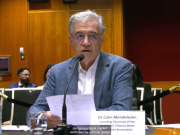Moreover the FCTC insists on offering outdated recomendations and guidelines which real-world data have shown do not work. An example of this is how it glorifies the anti-THR strategy adopted by Australia, even though this has failed miserably at reducing smoking rates, whilst ignoring the success acheived by Sweden, the only country which has acheived a smokefree status to date, by endorsing the use of snus.
Aerosol is NOT smoke
To this effect, during the conference attended by delegates from 183 countries, experts in the concerned fields have urged the WHO FCTC to provide comprehensive and accurate information about smoke-free products. Martin Cullip, an international fellow at the UK-based Taxpayers Protection Alliance’s Consumer Center, criticized the WHO FCTC for limiting consumer participation and attempting to redefine “smoke” in a way that challenges scientific integrity.
Clive D. Bates, director of the advocacy group Counterfactual, lamented the organization’s stance, arguing that it denies 1.3 billion smokers access to life-saving alternatives, such as heated tobacco products (HTPs). Bates highlighted the reduced harm associated with HTPs, emphasizing their distinct chemical composition compared to tobacco smoke. He criticized two WHO FCTC papers for misclassifying HTP aerosol as “smoke” and excluding scientific evidence about the products. He urged the organization to acknowledge court rulings in Germany and Sweden that distinguish between smoking and smokeless tobacco products based on combustion.
The EU excluded its own member states from the dealings taking place at COP10
Also being questioned, is the European Union’s alignment with WHO policies, with concerns raised about potential limitations on effective smoking cessation methods. Highlighting concerns raised by EU member states about being excluded from COP10 negotiations, and the need for transparency and inclusivity in discussions impacting public health, the criticism aligns with reports suggesting the WHO’s influence by special interest groups and the FCTC’s restrictive engagement with NGOs.
The European Commission’s Directorate General for Health and Food Safety (DG SANTE) is being accused of going beyond its mandate, with delegates reportedly agreeing to proposals that may impact harm reduction strategies, while EU member states are completely left in the dark. Notably, the exclusion of Sweden, the country which has reached the highest smoke-free success worldwide via a method not approved of by the FCTC, has raised eyebrows. The EU’s focus on making all forms of tobacco consumption socially unacceptable is contrasted by the success acheieved by Sweden thanks to snus.
The FCTC’s recommended measures fuel illicit trade
Similarly, many experts highlighted the conflict between the WHO’s MPOWER measures and the unintended consequences of raising taxes on tobacco, leading to increased illicit trade. They also underlined the EU’s perceived subservience to WHO policies, and exclusion of its own member states in considering these policies.
The WHO FCTC’s recommended extreme bans on communications related to tobacco and alternative nicotine products without sufficient justification were also criticized. THR advocates argued that such bans would contribute to an underground market for these products, citing the negative outcomes of a similar ban on cigarettes in India, which led to a flourishing black market.
In response to claims by the WHO that there is insufficient evidence showing that smoke-free products displace smoking at the population level, advocates pointed to a wealth of evidence from various reliable sources indicating the opposite. They emphasized that innovative, safer products should displace more dangerous ones.
Call for Transparency on Smoke-Free Products at the WHO FCTC Conference
Overall, the call for transparency and evidence-based policymaking emerged as a central theme, with advocates urging the WHO FCTC to consider the potential benefits of smoke-free alternatives and avoid measures that could inadvertently promote black market activities and hinder harm reduction efforts.
The Coalition of Asia Pacific Tobacco Harm Reduction Advocates (CAPHRA) has strongly criticized the WHO FCTC for excluding harm reduction advocates and consumer groups from the event. CAPHRA condemned the event’s meetings for stifling the voices of harm reduction advocates, particularly those supporting vaping, which has demonstrated significant success in reducing smoking prevalence when available and regulated.
The WHO FCTC’s closed and defensive posture at COP10 was highlighted, with reference to incidents such as refusing press accreditation and cutting off a delegate advocating harm reduction drawing attention. Despite the science recognizing vaping as an effective method to reduce the cancer risks associated with smoking, the conference organizers held firmly to their anti-vape positions.
So what was discussed during the conference?
Dr. Adriana Blanco Marquizo, Head of the Secretariat of the WHO FCTC, opened the COP10 conference by expressing concern about the rising availability of novel nicotine and tobacco products, especially among young people. She warned against tobacco industry messages portraying these products as a substitute for genuine tobacco control measures, completely overlooking the fact that most of these products are not manufactured by the tobacco industry at all.
Dr. Blanco Marquizo even urged vigilance against the tobacco industry’s persistent interference globally, attempting to undermine COP10 and previous conferences, once again ignoring the fact that countless experts in smoking cessation are behind what she is calling “interference.”
COP10 discussions consisted of various topics, including the regulation of tobacco product contents (Articles 9 and 10), depiction of tobacco in entertainment media related to advertising, promotion, and sponsorship, and addressing novel and emerging tobacco products.
The conference also discussed future tobacco control measures, the implementation of Article 19 regarding liability, improving the reporting system of the WHO FCTC, and the Implementation Review Mechanism. Ironically, there were also talks related to the contribution of the WHO FCTC to the promotion and fulfillment of human rights. Yet while harm reduction is actually one of the principles endorsed by the FCTC, apparently also according to the FCTC, tobacco harm reduction is not a human right of the millions of smokers worldwide dying of smoking-related diseases.
COP10 is being followed by the third Meeting of the Parties (MOP3) to the Protocol to Eliminate Illicit Trade in Tobacco Products which is being held this week from Monday, 12 February to Thursday, 15 February 2024.
Good COP/Bad COP
In response to the exclusion of COP10 (Bad COP), the Taxpayers Protection Alliance (TPA) has organized an inclusive fact-checking gathering, also in Panama. Known as the “Conference of the People (Good COP),” the event enlisted renowned experts in the fields of THR and smoking cessation, as well as consumers, to discuss tobacco-related issues in parallel with the discussions taking place at COP10.
The Conference of the People acted as a launching platform for a more extensive alliance of taxpayer, free-market, and harm reduction organizations. Its purpose was to counter the narrative presented by the FCTC Secretariat and specifically tackle issues raised during COP. Throughout each day of the conference, the experts, which included Greek cardiologist and researcher Dr. Konstantinos Farsalinos and Italian respiratory physician and expert Dr. Ricardo Polosa, convened to provide real-time responses to COP proceedings.




![Recent Conference Urged Nations Worldwide to “Quit [Smoking] Like Sweden”](https://www.vapingpost.com/wp-content/uploads/2024/04/vape-conference-238x178.png)



![Recent Conference Urged Nations Worldwide to “Quit [Smoking] Like Sweden”](https://www.vapingpost.com/wp-content/uploads/2024/04/vape-conference-180x135.png)



